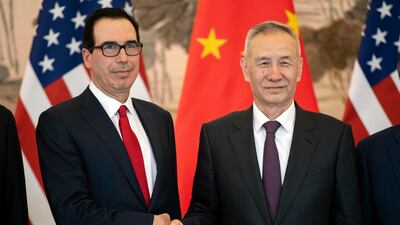US and Chinese negotiators wrapped up "constructive" trade talks in Beijing on Friday ahead of another round next week, a top American official said, as the economic superpowers aim to settle a bruising tariffs battle.
US trade representative Robert Lighthizer and treasury secretary Steven Mnuchin held negotiations with China's vice premier Liu He at the Diaoyutai State Guesthouse after a working dinner on Thursday.
Mr Mnuchin wrote on Twitter that he and Mr Lighthizer "concluded constructive trade talks in Beijing" but he did not provide more details.
"I look forward to welcoming China's vice premier Liu He to continue these important discussions in Washington next week," he said.
The two negotiating teams, including China's central bank chief Yi Gang, posed for pictures in front of Chinese and American flags, but they did not make statements to the media.
Officials are seeking to iron out major differences over US accusations that China has been using unfair trade practices for years by heavily subsidising its companies while snatching the technological know-how of American firms.
US President Donald Trump has said the two sides were close to a deal, but officials have played down expectations of an imminent agreement.
In Washington, White House economic adviser Larry Kudlow said the talks were not "time-dependent" and could last weeks or even months if necessary.
The talks are "policy and enforcement dependent", Mr Kudlow said.
The Chinese commerce ministry said a "large amount of work" remains to be done and both sides confirmed before this round of talks that another face-to-face negotiation was scheduled for Washington next week.
The two sides have imposed tariffs on $360 billion in two-way trade since last year but Mr Trump and Chinese leader Xi Jinping agreed to a truce in December.
Mr Trump suggested last week that some of those tariffs should stay in place after a deal is reached to ensure China keeps its end of any bargain.
"We have to see what the track record is and we're not going to give up our leverage," said Mr Kudlow.
"It doesn't necessarily mean that all the tariffs will be kept in place, some of the tariffs will be kept there," he told Bloomberg.
US insistence on keeping the first tranche of 25 per cent tariffs on $50bn worth of Chinese imports could be a sticking point for a deal, analysts say.
It is hard to predict if China will accept a deal leaving some tariffs in place, said economist Cui Fan of the University of International Business and Economics in Beijing.

